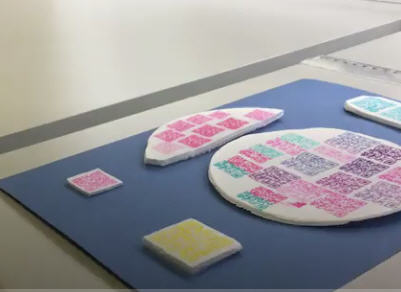New technology: Edible QR code can be the medicine of the future

Researchers at the University of Copenhagen have developed a new method for the production of medicine. They print medical drugs in QR coded patterns onto an edible material. The production can be tailored to fit each patient and has the potential to protect against wrong medication and fake medicine according to the researchers. Credit: Faculty of Health and Medical Sciences, University of Copenhagen
This production might soon be in the past. In a new study, researchers from the University of Copenhagen together with colleagues from Åbo Akademi University in Finland have developed a new method for producing medicine. They produce a white edible material. Here, they print a QR code consisting of a medical drug.
“This technology is promising, because the medical drug can be dosed exactly the way you want it to. This gives an opportunity to tailor the medication according to the patient getting it,” says Natalja Genina, Assistant Professor at Department of Pharmacy.
Potential for reducing wrong medication and fake medicine
The shape of a QR code also enables storage of data in the “pill” itself.
“Simply doing a quick scan, you can get all the information about the pharmaceutical product. In that sense it can potentially reduce cases of wrong medication and fake medicine,” says Natalja Genina.
The researchers hope that in the future a regular printer will be able to apply the medical drug in the pattern of a QR code, while the edible material will have to be produced in advance to allow on-demand production of medical drug near end-users.
“If we are successful with applying this production method to relatively simple printers, then it can enable the innovative production of personalized medicine and rethinking of the whole supply chain,” says professor Jukka Rantanen from Department of Pharmacy.
The researchers are now working to refine the methods for this medical production.
###
This research has been financed by the Independent Research Fund Denmark.
Media Contact
All latest news from the category: Medical Engineering
The development of medical equipment, products and technical procedures is characterized by high research and development costs in a variety of fields related to the study of human medicine.
innovations-report provides informative and stimulating reports and articles on topics ranging from imaging processes, cell and tissue techniques, optical techniques, implants, orthopedic aids, clinical and medical office equipment, dialysis systems and x-ray/radiation monitoring devices to endoscopy, ultrasound, surgical techniques, and dental materials.
Newest articles

Bringing bio-inspired robots to life
Nebraska researcher Eric Markvicka gets NSF CAREER Award to pursue manufacture of novel materials for soft robotics and stretchable electronics. Engineers are increasingly eager to develop robots that mimic the…

Bella moths use poison to attract mates
Scientists are closer to finding out how. Pyrrolizidine alkaloids are as bitter and toxic as they are hard to pronounce. They’re produced by several different types of plants and are…

AI tool creates ‘synthetic’ images of cells
…for enhanced microscopy analysis. Observing individual cells through microscopes can reveal a range of important cell biological phenomena that frequently play a role in human diseases, but the process of…





















